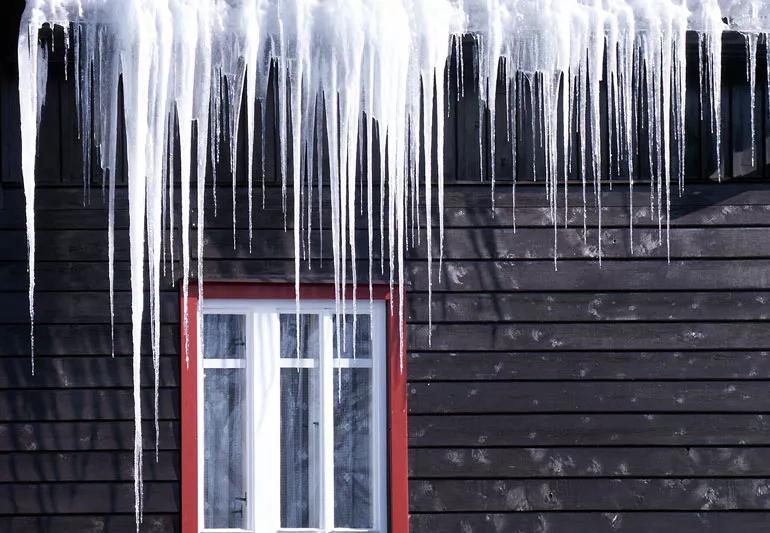Practical tips on how to stay safe around these hanging hazards

Image content: This image is available to view online.
View image online (https://assets.clevelandclinic.org/transform/783a781a-7221-48d4-b1c8-397c30a9b4c6/iciclesDangerous-91440503-770x533-1_jpg)
Dangerous icicles above window on house
As if the snow and cold aren’t enough to deal with in the winter, another danger often hangs over our heads: the large icicles that form on many homes and buildings.
Advertisement
Cleveland Clinic is a non-profit academic medical center. Advertising on our site helps support our mission. We do not endorse non-Cleveland Clinic products or services. Policy
When temperatures thaw or fluctuate widely, these frozen sculptures start crashing down to the ground below and can cause injuries this time of the year, says emergency medicine physician Tom Waters, MD.
“The biggest concern when you get hit by an icicle, of course, is you could get cut and start to bleed, or in the case of being hit on the head, you could end up with a concussion or other type of head injury,” Dr. Waters says.
Dr. Waters says if an icicle hits you in the head, you may see an alarming amount of blood at first. That’s because the scalp contains a lot of blood vessels. But it’s important to remain calm and get the bleeding under control with direct pressure.
To treat a minor cut to the head, wash your hands with soap or antibacterial cleanser. Then gently wash the cut with mild soap and water. Use direct pressure to stop the bleeding, and then apply an antibacterial ointment and a clean bandage that won’t stick to the wound.
If you’re hit in the head by a large piece of falling ice and don’t bleed, you still may be injured. If you develop a headache or feel nauseous or vomit, Dr. Waters says you may have a concussion or an even more serious head injury and should seek medical attention immediately.
Advertisement
Icicles are rarely sharp enough to penetrate your skin or impale you, but they can cause bad bruises and even broken bones.
Dr. Waters says to resist the urge to knock down icicles while standing on a ladder or by climbing on the roof. Winter weather makes these types of activities extremely unsafe because of the risk of falling.
Consider calling in experienced professionals to remove ice buildup or icicles that are extraordinarily large.
“Ladders are extremely dangerous because the ground is slippery and creates unstable conditions,” Dr. Waters says. “There can be snow and ice buildup on the rungs and on the bottoms of your shoes. Often you just don’t know what’s on the ledge that you’re leaning the ladder against. There could be icicles, or ice, the ledge could break, or the ladder could slip or move.”
Dr. Waters says if you do get hurt by falling ice and you’re unsure how severely you may be injured, err on the side of caution and go to the emergency room.
Advertisement

Sign up for our Health Essentials emails for expert guidance on nutrition, fitness, sleep, skin care and more.
Learn more about our editorial process.
Advertisement
Dressing in multiple layers, drinking warm liquids and taking breaks indoors can help prevent these cold-weather injuries
Exerting yourself in cold temperatures increases your risk of a cardiac event
Used correctly, a humidifier can help with nose bleeds, allergies, dry skin, sleep quality and more
Stretch before heading outside, keep proper form and avoid jerking or twisting to throw snow
If the flakes are undisturbed, pristine white and come from the top layer, it’s typically safe to indulge in a scoop
Bottom line? Dress warm, be careful and plan ahead to get the most out of the season
Sneak in exercise when you can, pack your own lunch and make time for mental health
Taking slow, short steps and wearing proper footwear can go a long way in preventing falls
Prioritize your health by managing stress, strengthening your social connections and getting quality sleep
Bolsters, blankets, pillows and blocks can offer extra support, stability and comfort
Allergies, postnasal drip, asthma or reflux could be to blame for a cough that won’t quit